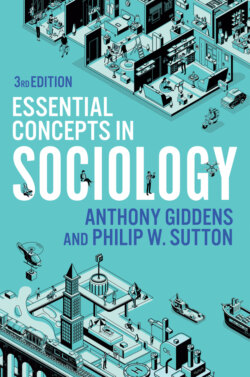Читать книгу Essential Concepts in Sociology - Anthony Giddens - Страница 68
Meaning and Interpretation
ОглавлениеFor Cooley, Mead and the symbolic interactionist tradition more generally, the process of ‘self’ construction makes human beings ‘reflexive’ – actively engaged in social life and, at the same time, able to reflect on it. This individual reflexivity means that active human agents can confound scientists’ predictions of how they will or should behave, and it also shows that the thing called ‘society’ is a continuous social construction rather than a fixed, objective entity that is set apart from individuals. Self-fulfilling prophecies can illustrate some of the consequences of reflexivity as well. Rumours of trouble at a solidly solvent bank can lead to investors rushing to withdraw their money, which in turn fulfils the false prophecy by putting the bank into trouble (Merton [1949] 1957). Knowledge and information of all kinds have the potential to alter people’s decision-making processes and lead to unpredictable actions.
In the work of Anthony Giddens, Ulrich Beck and others, reflexivity is a key concept for understanding contemporary societies. Giddens and Beck argue that ‘late’ modernity is a ‘de-traditionalized’ social context in which individuals are cut adrift from the social structure and, hence, forced to be continuously reflexive in relation to their own lives and identities. Beck calls this emergent form of society ‘reflexive modernization’, a ‘second modernity’ or a ‘risk society’ beyond the industrial form. The consequences of this heightened reflexivity for research practice are said to be profound. Sociological research findings become part of society’s stock of knowledge, which individuals carry around with them and which underpins their decision-making. The kind of recursive effects evident in self-fulfilling and self-defeating prophecies become part and parcel of social life as such. In this way a simple positivistic approach based on the objective study of an external world ‘out there’ appears misguided, as the gap between researcher and research subject is eroded. Similarly, the methods adopted by sociologists have to reflect this, which may be why qualitative methods such as biographical research, oral histories and the inclusion of the researcher’s own biography in the research process are growing in popularity. The concept of reflexivity has become central to both social theorizing and sociological research methods, pointing up the inevitable connections between the two.
